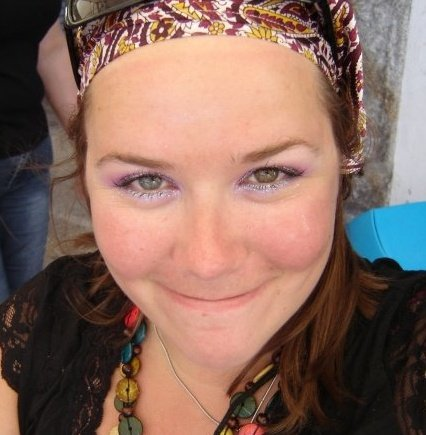Harvey, Lou (MA and PhD alumna)
 Hello, and welcome to my page! I’m Lou and I’m on the 1+3 MSc leading to PhD programme. My TESOL adventure began in 2004 when, at the University of Edinburgh and desperate for money to go travelling in the US later in the summer, I got a job teaching English at a four-week language school in the city (not the first time I’d been thankful for being in Edinburgh, incidentally – a city bountiful in language schools and summer English programmes). With no training and possibly the world’s dullest textbook, I found myself facing two classes of 15 boisterous Elementary and Pre-Intermediate Italian teenagers who just wanted to talk. Fortunately I too like to talk, and equally fortunately I can talk louder than a room of Italian teenagers – so talk we did, sharing opinions on anything and everything they wanted to, with a little textbook work as trade-off. I loved it, the four weeks disappeared in no time, I went on my travels, and started my final undergraduate year in the awareness that the amniotic confines of university were weakening, the waters would soon break, and I’d be out in the world armed only with an English Language and Literature degree and a sunny disposition. Given how much I’d enjoyed the summer teaching and my degree subject, it seemed not a vast leap of faith to do a CELTA course and teach English overseas for a while – especially when what I really wanted to be was a writer (honestly, how many TEFL teachers have you met who didn’t?), and teaching seemed a pleasant way to pass the time while I knocked out a novel. So in September 2005 I gathered up my skirts and headed for Bratislava, to a job at a private language school teaching adults and teenagers at various levels, and wrote in my spare time, setting myself a target of 5000 words a week. An easy target at first; an increasing struggle as I got more into the teaching, made friends with my students, found weekend diversions far more sociable than sitting in my room typing. Still, my novel was finished by December and duly sent to various agents over the Christmas holidays. And I returned to Slovakia wildly excited, bounding to the phone whenever it rang in case it was my parents to tell me I’d had an acceptance letter…
Hello, and welcome to my page! I’m Lou and I’m on the 1+3 MSc leading to PhD programme. My TESOL adventure began in 2004 when, at the University of Edinburgh and desperate for money to go travelling in the US later in the summer, I got a job teaching English at a four-week language school in the city (not the first time I’d been thankful for being in Edinburgh, incidentally – a city bountiful in language schools and summer English programmes). With no training and possibly the world’s dullest textbook, I found myself facing two classes of 15 boisterous Elementary and Pre-Intermediate Italian teenagers who just wanted to talk. Fortunately I too like to talk, and equally fortunately I can talk louder than a room of Italian teenagers – so talk we did, sharing opinions on anything and everything they wanted to, with a little textbook work as trade-off. I loved it, the four weeks disappeared in no time, I went on my travels, and started my final undergraduate year in the awareness that the amniotic confines of university were weakening, the waters would soon break, and I’d be out in the world armed only with an English Language and Literature degree and a sunny disposition. Given how much I’d enjoyed the summer teaching and my degree subject, it seemed not a vast leap of faith to do a CELTA course and teach English overseas for a while – especially when what I really wanted to be was a writer (honestly, how many TEFL teachers have you met who didn’t?), and teaching seemed a pleasant way to pass the time while I knocked out a novel. So in September 2005 I gathered up my skirts and headed for Bratislava, to a job at a private language school teaching adults and teenagers at various levels, and wrote in my spare time, setting myself a target of 5000 words a week. An easy target at first; an increasing struggle as I got more into the teaching, made friends with my students, found weekend diversions far more sociable than sitting in my room typing. Still, my novel was finished by December and duly sent to various agents over the Christmas holidays. And I returned to Slovakia wildly excited, bounding to the phone whenever it rang in case it was my parents to tell me I’d had an acceptance letter…
But we all know where this story is headed. Rejection followed rejection followed rejection, and I came to realise that the writing dream may not be as immediately forthcoming as I’d hoped. And besides, this teaching lark – I was really rather enjoying it, and discovering so much about my students, myself, learning, living, being. By the end of my first academic year I’d decided it was worth investing in and decided to apply for the MEd TESOL at the University of Glasgow, my favourite UK city – though as the application deadline loomed, and having returned to Bratislava for my second year, I suddenly felt it would be good to be near my Cheshire-based family again, and applied to the MA at Manchester instead. And what a wonderful, exciting, enriching experience it was – I felt I’d found a way in to a world I’d never quite known how to access before, a world of seeking and exploration and discovery. I graduated in 2008, and worked at a private language school in Manchester for a year while working on my PhD funding application.
And so to my research interest, which was sown with a small-scale enquiry for the Psychology of Language Learning module, germinated into a pilot study for the Developing Researcher Competence module, sprouted into my MA dissertation, and blossomed into a PhD project. Motivation for learning another language is a broad and well-researched field, but comparatively few studies have explored motivation for learning English in particular, and even fewer have conceptualised motivation as relational, contextual, shifting and processual. My interest is the relationship between motivation, identity and agency, the kinds of English-speaking future selves learners identify with, the opportunities they imagine they can access and participate in in a globalising world while remaining integrated into their own culture, and the configurations of power relations which operate upon learners to provide and block linguistic and social resources. In such an approach, learners must be seen as human beings rather than just language learners, as agents with biographies situated in historical and cultural contexts, rather than the depersonalised, cognitively componentised learner of the ‘individual differences’ approach to motivation. Thus I am interested in qualitative approaches to motivation research, which foreground the voices of learners.
And here I am again, having intended to write a paragraph or two and ending up writing almost another novel. Apologies, and thanks for bearing with me. I do love writing, and happily there’s lots of it to be done in this line of work. I suppose the only disadvantage is that with writing so much for work, I don’t write specifically for ‘pleasure’ any more, but there’s so much satisfaction in the work, so much of myself bound up with what I do, that I rarely feel the lack of it.
For further information on my research, please visit my website and my PhD blog. Thanks for reading!
2 comments
You must log in to post a comment.

Hi there
just to pick up on Richard’s point – having read your profile, Lou, in the light of that comment, I am inspired to expand on my profile in the same way. Coming soon…
Thanks Lou. 🙂 Fascinating. A great picture too.
Novels invite lots of comments / commentary, but I’ll keep this brief and pick up on one thing that interests me in general, and in your case also, and that concerns the genesis of research foci. You write that the seed for your research interest was “sown with a small-scale enquiry for the Psychology of Language Learning module, [then] germinated into a pilot study for the Developing Researcher Competence module, [then] sprouted into my MA dissertation, and [finally] blossomed into a PhD project”.
I think this is a development process which others share (e.g. Eljee?), a process which might be located on the Manchester MA TESOL programme but could also be located in similar academically-oriented professional reflections undertaken elsewhere. Are there other deveopment stories out there? I wonder for example where Achilleas’ focus arose, and Viv’s, and Carol’s, and …